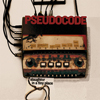Pseudocode, "Slaughter in a Tiny Place"
 Although they appeared on a variety of compilations in the early 1980s, including the legendary Rising from the Red Sands, Pseudocode mostly remained unknown, putting out their own cassettes and the occasional odd 7", but never reaching the same levels of notoriety that contemporaries in the early industrial underground enjoyed. Nearly 30 years later, some of these earliest recordings have been issued, for the first time, in a deluxe double LP package.
Although they appeared on a variety of compilations in the early 1980s, including the legendary Rising from the Red Sands, Pseudocode mostly remained unknown, putting out their own cassettes and the occasional odd 7", but never reaching the same levels of notoriety that contemporaries in the early industrial underground enjoyed. Nearly 30 years later, some of these earliest recordings have been issued, for the first time, in a deluxe double LP package.
This Belgian trio, consisting of Xavier S (Thrills) on vocals, Alain Neffe (Insane Music) on synths and horns, and Sub Rosa co-founder Guy Marc Hinant on guitars were essentially caught up in the post-punk and early industrial movements that were ongoing when these tracks were recorded between 1980 and 1982, with only a few being released on compilations in edited forms.The full package feels like a pristine copy of a C90 uncovered by one of the band members, and presented beautifully to a world finally ready to hear it.
Pseudocode definitely had their own sound and style, but there are influences to be heard.The guitar noise and atonal vocals of "Growing Down" would have fit in on the first DAF album, even if the monotone drum machine pound wouldn't, and the filtered rhythms and synth stabs of "Cut Up" resemble Throbbing Gristle, even more so considering Xavier's sounds quite a bit like Genesis P-Orridge via the echo chambered vocals.
Given their source, it is not shocking that there’s a few tracks that meander a bit longer than they should.The cheap synths and random drum machine rhythms on "You're Not Alone" bounce around for most of the song without going anywhere until the final moments, when it locks into a more aggressive, pounding sound that ends too quickly."Flesh Shop" has the same feeling, with the skittering and delayed rhythms propelling a track, that feels like it could use some editing, but throws in everything but the kitchen sink, sonically.Well, not the kitchen sink, but it sounds like someone left The Cure's Seventeen Seconds playing on a tape deck somewhere in the studio.
The strongest songs are where the band seems to click together in their improvisations:the trashcan drums, dubby bass, and sax on "I Don't Say More" put a perverse skronk into the otherwise un-funky collection."Sad Song" has metronomic snare rhythms that belie the more complex pianet melodies and analog synths, pushing the song more into an early electro pop realm."Fight Back (The Angels)" has a combination of filtered guitar, chintzy beats, and robotic vocals that also seem to straddle that line between intentionally abrasive industrial noise and early stabs at synth pop, which reminded me of some of those early Cabaret Voltaire experiments.
While I don't think Pseudocode will be spoken of with the same hushed reverence we have for the likes of Throbbing Gristle or Suicide, there are a lot of rough gems here that are just fine without any polish.Rather than mimicking their influences, this trio clearly integrated them, but had their own thing going on.It might not be a revelatory lost classic of proto-industrial music, but it's still a fun album. Plans for future releases of unreleased works is in the pipeline.
samples:
 



